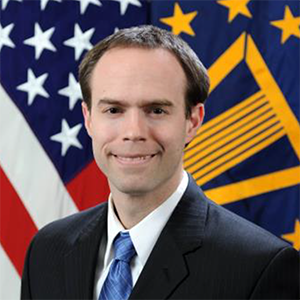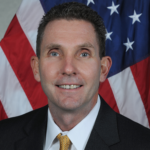From satellites to launch to ground systems to new services, there is a renaissance underway in space technology. But there is also a gap between government processes and commercial business practice that slows cross-fertilization between these worlds. Government procurement rules are one area that has received considerable attention, and there are others closely related, such as how to better operationalize government research investment, integrating space systems with other networking advancements, policies for leveraging new offerings in space-based data and more.
 Phil Carrai
Phil Carrai
Phil Carrai is President of the Space, Training and Cybersecurity division of Kratos Defense and Security Solutions, Inc, where he is responsible for all aspects of business operations, sales, mergers and acquisitions. Kratos Defense is an approximately $650 million public company focusing in Aerospace and Defense products and services.
 Brig Gen. Steve “Bucky” Butow
Brig Gen. Steve “Bucky” Butow
Steve “Bucky” Butow is the Director of the Space Portfolio at the Defense Innovation Unit (DIU). He joined the team in 2015 as an early plank owner when DIU was known as the Defense Innovation Unit Experimental (DIUx) and helped establish the organization’s operating locations in Silicon Valley; Boston, Massachusetts; and Austin, Texas.
Prior to joining DIU, Butow was the Vice Chief of the Joint Staff, California Military Department with responsibilities including cybersecurity, incident awareness and innovation. He is a former Commander of the 129th Rescue Wing at Moffett Federal Airfield, CA, where his responsibilities included organizing, training, equipping, and maintaining 970 combat-ready forces and $1 Billion dollars of MC-130P aircraft, HH-60G
helicopters and special mission equipment supporting the U.S. Air Force’s combat rescue and personnel recovery missions. He has additionally served as the Deputy Director of the Joint Search and Rescue Center for U.S. Central Command in 2005, and as Chief of Personnel Recovery for U.S. Air Forces Central in 2007 supporting Operations IRAQI and ENDURING FREEDOM. He has more than 3,500 flying hours in T-37, T-38, C-130, HC-130 and MC-130P aircraft. In his reserve capacity, Butow is a Brigadier General serving part time as a Special Assistant to the Director, Air National Guard in a federal status.
As a researcher with the Search for Extraterrestrial Intelligence (SETI) Institute, Butow worked on instrument concepts for Mars surface soil analysis at NASA Ames Research Center in Mountain View, CA. He later served as co-principal investigator for a series of airborne science missions for which he was recognized for outstanding achievement and contributions to the Space Science Division in 1999 and received an Ames Honor Award as a member of an Astrobiology Mission Project Team in 2000.
Butow graduated from San Jose State University with a B.A. in Physics & Astronomy and earned a M.S. in Management with specialization in Air and Space Strategic Studies from the University of Maryland. He has also completed executive courses at Harvard’s John F. Kennedy School of Government, and was a member of the National Leadership Preparedness Initiative (NPLI) Cohort 16. Butow is a lifetime member of the Honor Society of Phi Kappa Phi for academic achievement.
 Preston Dunlap
Preston Dunlap
Mr. Preston C. Dunlap is the Chief Architect of the Department of the Air Force. First to hold this position, Mr. Dunlap is charged with working across the Air and Space Force, and in partnership with the Department of the Navy and Army, to transform technology development and acquisition so the Air Force not only designs, develops, and buys the right mix of future capability but does so more rapidly and with the power of interoperability. Key family of systems initiatives include Multi-domain Operations, Advanced Battle Management System, and Next Generation Air Dominance.
Prior to this position, Mr. Dunlap was the Executive for National Security Analysis of the Johns Hopkins University Applied Physics Laboratory, the nation’s largest University Affiliated Research Center.
There he oversaw national security defense and intelligence programs at all levels of classification and managed an extensive and diverse organization of program managers, technologists, analysts, and operators. He led programs in support of the Vice President of the United States, Cabinet Secretaries, the Secretary of Defense, and the Director of National Intelligence. Mr. Dunlap served on the corporate Executive Leadership Team of the Laboratory. At the request of Congress, he also testified before the full House Armed Services Committee.
Before joining the Laboratory in 2014, Mr. Dunlap was a career member of the Senior Executive Service and served four Secretaries of Defense. He held the roles of Director of Program Analysis, Chief of Staff to the Senate-confirmed Director of Cost Assessment and Program Evaluation, Senior Analyst for Intelligence, Surveillance, and Reconnaissance (ISR) and Space Programs, and Deputy Director of the Simulation and Analysis Center. He shaped the Department of Defense five-year multi-billion dollar budget plans as well as associated Intelligence Community and National Nuclear Security Administration plans.
Mr. Dunlap led the Long Range Strike Front End Assessment and started the B-21 bomber program as well as future weapons, hypersonics, intelligence, electronic warfare, and communications capabilities for Secretary Gates and Secretary Panetta. He served in a lead role of the Strategic Choices and Management Review for Secretary Hagel where he identified options and risks required to meet the Budget Control Act that would reduce the budget by over $50 billion per year. He also participated in the 2006, 2010, and 2014 Quadrennial Defense Reviews.
Prior to government, Mr. Dunlap held various roles in the private sector as an early member of a rapidly growing technology startup company as well as an agile software development firm.
He earned a Master of Science degree with honors in Operations Research and Management Science from George Mason University and a Bachelor of Arts degree in both Computer Science and Political Science from Duke University. Mr. Dunlap is Lean Six Sigma certified and is a graduate of the Harvard University National Security Senior Executive program and the Federal Executive Institute and served on the Board of the Massachusetts Institute of Technology Seminar XXI program. Mr. Dunlap’s awards include the Secretary of Defense Medal for Meritorious Civilian Service and multiple citations of both the Secretary of Defense Medal for Exceptional Civilian Service and Secretary of Defense Award for Excellence.
 Dr. Debra L. Emmons
Dr. Debra L. Emmons
Dr. Debra L. Emmons is the General Manager of the Communication Technologies and Engineering Division at The Aerospace Corporation. In this role, she is responsible for leading a geographically distributed division of 200+ engineers and 30+ laboratories supplying expertise across the full range of communications and networking programs, technologies, and system architectures to Aerospace’s many customers. She also leads the strategy development for the Optical communications center, SPIDER providing solutions to customers across the space enterprise.
Prior to her current role, Dr. Emmons served as Associate General Manager of the Strategic Assessments & Studies Division in the Civil Systems Group, leading the line of business serving customers across all the NASA Science & Technology focused centers, universities, and non-profit entities. Within this line of business, she led strategic planning, new business development, and program development and execution.
Dr. Emmons is a skilled aerospace senior leader with technical, management and industry experience in the acquisition and development of advanced technology space systems. She has over 25 years of experience developing and leading cross-enterprise teams of technical experts to solve the nation’s toughest national security, civil and commercial space problems.
Dr. Emmons currently serves on the MILCOM organizing and technical program committee, and the IAF/IAC Space Communications & Navigation Committee (SCAN). She also served on the Board of Directors of the National Space Club, in Washington DC from 2010 through 2016. In the 2015-2016 term, Dr. Emmons served as the President of the National Space Club & Foundation.
Dr. Emmons was awarded a Ph.D. in Systems Engineering from The George Washington University. She earned an M.S. and a B.S in Electrical Engineering from Cornell University, Ithaca, NY. She was also awarded an MBA from Imperial College Management School, London, United Kingdom.
 Mike Nichols
Mike Nichols
Mr. Nichols has managed DoD meshed network solutions, including terrestrial transport, data applications, and commercial satellite services as a Department of Defense government civilian for more than 32 years.
During the span of his career, Mr. Nichols has managed communication services for the United States Navy Europe/Central Region in Naples, Italy, was a project manager for European terrestrial transport initiatives based out of Stuttgart, Germany, and served as a senior advisor to the Afghan Ministry of Communications and Technology in Kabul, Afghanistan as part of the U.S. Department of Defense Telecommunications Advisory Team.
Prior to his current position, Mr. Nichols was the Deputy Chief for the DoDs Enhanced Mobile Satellite Services (EMSS).
A U.S. Navy Veteran, Mr. Nichols is proud to serve the Department of Defense and provide critical C5ISR that enable warfighter capabilities.